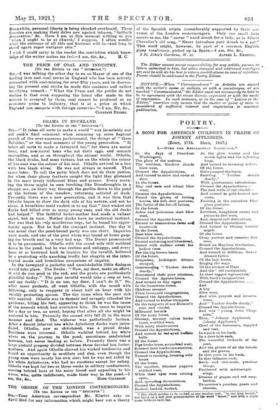DRAMA IN DUCRLAND. [To THE EDITOR OF THE " SPECTATOR."]
SIR,—" It takes all sorts to make a world " was invariably our old cook's final comment when summing up some flagrant
prank of the over-amorous parlourmaid, the doings of " them Boishies," or the mad manners of the young generation. "It takes all sorts to make a farmyard too," for there are moral hens, and non-moral hens who eat their eggs, and commit enormities, and so on throughout the animal world. Othello, the black drake, had some virtues, but on the whole the colour of his coat was the colour of his soul. Othello arrived in a box with two black wives. He was not always so named. That came later. To call the party black does not do them justice, for when their glossy feathers caught the light they glistened in the most lovely iridescent blues and greens. Every morn- ing the three might be seen lurching like Dreadnoughts in a choppy sea, on their way through the garden down to the pond at the bottom of the meadow, returning satiated at dusk. Presently there was a new generation, and it was then that Othello began to show the dark side of his nature, and not he alone. -A breathless maid rushed in to say that " that wicked old drake had killed ever so many young ones, and the old ducks had helped:" The faithful foster-mother had made a valiant stand, but in vain. Mother ducks have no maternal instinct. Nor was that his 'wily murderous orgy, for he found his oppor- tunity again. But he had the conjugal instinct. One day it was .noted that the pond-bound party was one short. Inquiries were made, and one of the poor wives was found at home gasp- ing for breath and in a very bad way. The Doctor pronounced it to be pneumonia. Othello with the sound wife still .wobbled down to the pond, but he was restless and unhappy, and every hour or so hastened back to inquire for the invalid, followed by a protesting wife quacking loudly her chagrin at the inter- rupted meals and breathless excursions of inquiry.
In the farmyard a- pathetic and unmistakable little dialogue would take place. The Drake : " Now, my dear, make an effort; it will do you good in the end, and the grubs are particularly
plentiful to-day." The poor invalid would take a step or two, and say feebly : "It is no use, my dear, I can't do it." So,
after more protests, off went Othello, with the sound wife following, only to reappear in about half an hour with his volubly protesting spouse. The day came when the poor sick wife expired. Othello was in despair and savagely attacked the gardener, biting his feet, appearing to think he was the cause of the nemesis which had overtaken him. He came to inquire for a day or two, as usual, hoping that after all she might be restored to him. Presently the second wife fell ill in the same manner and died. The widower was pathetically forlorn.
After a decent interval two white Aylesbury ducks were intro- duced. Othello, now so christened, was a proud drake. Positions were reversed. Othello waddled behind his white wives on the journey to the pond, sometimes sandwiched
between, but never leading as before. Presently there was a large piebald progeny-divided between three devoted hen foster- mothers. And again Othello showed his wicked tendencies and found an opportunity to mutilate and slay, even though the young ones were nearly his own size; but he was not aided by his white Aylesburys, who had no emotions except for eating. Othello was kept for two or three weeks in solitary confinement, cursing behind bars at his noisy brood and appealing to his wives, who, quite indifferent, made their way to the pond.—I'


































 Previous page
Previous page